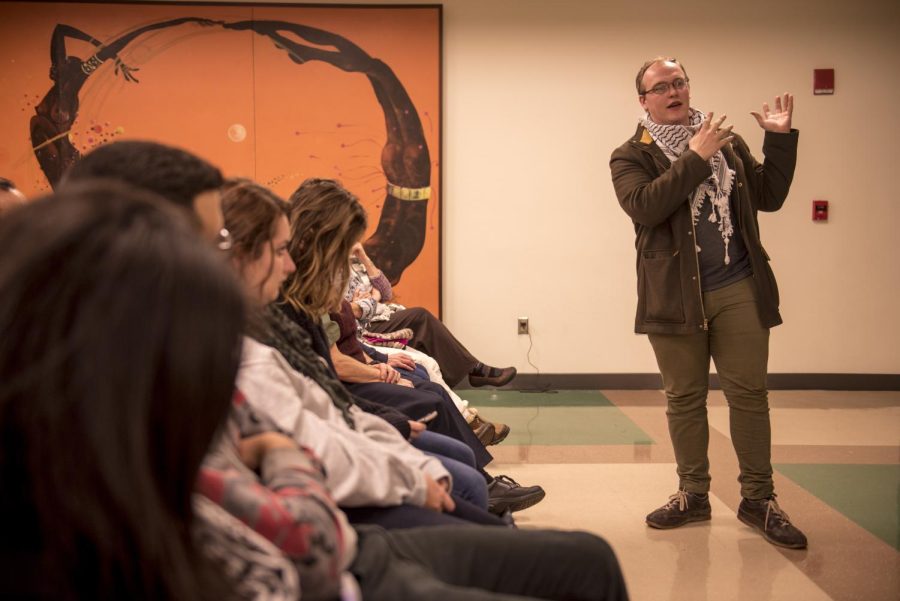Speakers give new perspective on Syrian refugee crisis
Anthony Harris advocates and explains the importance of working with overseas refugees on a local level. Harris offers the Cleveland non-profit organization he works for as a means to do so at the “Escape and Resettlement: The Life of a Refugee” Safe Spaces event in Oscar Ritchie Hall Thursday, Jan. 26, 2017.
“The question remains: Why is it so easy to make gross generalizations and to spark fear about refugees to people?” Dr. Louise Cainkar said while speaking to the audience. “Anti-Syrian refugee sentiments have been such a zenith not because of anything they’ve done, but because hatemongers can capitalize on pre-existing widespread anti-Muslim and anti-Arab sentiments.”
Cainkar, sociologist and associate professor of social welfare and justice at Marquette University, was one of the guest speakers during the 11th installment of the Safe Spaces speaker series called “Escape to Resettlement: The Life of a Refugee,” on Thursday, Jan. 26.
Joining Cainkar was Kent State graduate Will Charles, who now works with the United States Conference of Catholic Bishops (USCCB) to help refugees relocate to the United States and assimilate quickly.
Cainkar has conducted extensive research in the Middle East, including visits to refugee camps, and has published multiple books and essays on her experiences. She sees these speeches as an opportunity to relieve hate that fuels rhetoric in the United States, and wishes to break the stereotypes given to Arab refugees by sharing her experience.
Cainkar, also the director of the peace studies program at Marquette, noted how countries such as Jordan, Iraq and Lebanon are accepting refugees graciously.
“I think the United States is regressing in terms of accepting refugees. I think we’re regressing in terms of civility towards each other,” Cainkar said. “The countries that are hosting all these Syrian refugees are countries we stereotype as bad, dangerous places, and I think we need to give them credit for what they’re doing over there.”
Cainkar also said that many of the stereotypes Americans tend to assume about Syrian refugees are unfounded and may stem from the Paris attacks in November 2015.
“Syrian refugees were immediately and falsely blamed for these vicious attacks, when, in fact, most of the perpetrators were European-born citizens,” Cainkar said.
Charles later took to the podium to explain the processes his co-workers and himself go through to vet potential asylees. He credits Kent State with helping him reach this place in his career.
“When I was at Kent, the reason I started to get involved was these types of events and my professors were a big part of that. I wouldn’t be where I’m at today, working alongside refugees, without them,” Charles said. “So it’s important for me to give back to Kent as well and help pique the interest of anyone in this room who might be interested in helping.”
This included sophomore political science major Julia Pharmer, who said she became interested after learning about the refugee crisis in her classes.
“I really felt compelled to help,” Pharmer said. “Just hearing about them doing the things I hope to do some day is encouraging.”
Dr. Julie Mazzei, associate professor of political science and co-founder of Safe Spaces, said she hopes that people leaving the event realize that human beings should not be reduced to statistics.
“People are people. These are human beings that we’re talking about. All of our events are about marginalized people and it’s very easy to treat them like statistics,” Mazzei said. “I hope people realize this: there are real facts that exist. They’re not hard to find. Those facts should be what you use to evaluate policies. Formulating opinions without facts is just not intelligent.”
Charles agreed with Mazzei’s comments on the importance of support and education.
“These could be a long four years for refugees, immigrants and vulnerable populations in this country,” Charles said. “I would tell people, if they’re able, they can help out with vulnerable populations. Volunteering would be really great. Every little bit helps.”
Cameron Hoover is a general assignment reporter, contact him at [email protected].



